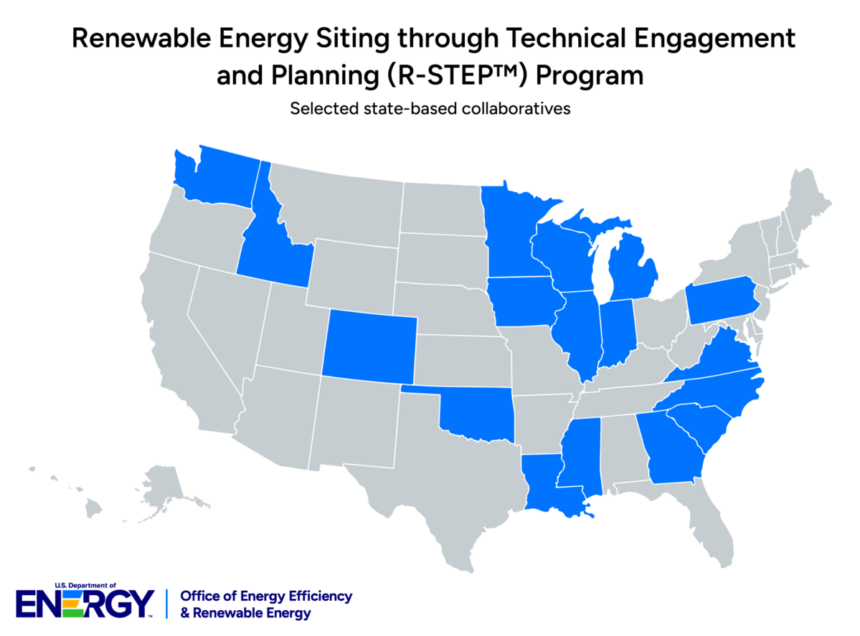The U.S. Department of Energy (DOE) today announced the selection of four projects totaling $7.1 million to expand a program that improves planning, siting, and permitting processes for large-scale renewable energy and energy storage facilities across the United States. The collaborative teams formed through these projects, as well as 12 previously selected under the Renewable Energy Siting through Technical Engagement and Planning (R-STEP™) program, will develop and expand statewide initiatives that provide expertise, trainings, and technical resources to local governments, Tribal governments, and communities as they plan for and evaluate large-scale renewable energy and energy storage projects.
A significant portion of large-scale renewable energy and energy storage projects built in the coming years are likely to be built on private lands, where state and local authorities make permitting decisions. The state-based R-STEP collaboratives will evaluate the needs of stakeholders in their regions and develop tailored educational materials and technical assistance programs to improve planning and streamline project reviews and permit decisions. This will result in renewable energy and energy storage projects that contribute to strong local economies, resilient energy systems, and lower energy costs for households and businesses, especially in rural or underserved communities.
The R-STEP collaboratives bring together stakeholders from all sides of the energy planning process, including state and regional agencies, universities, developers, technical experts, public service commissions, farmers unions, tribes, community organizations, and other trusted entities.
The four newly selected collaboratives are:
- Illinois: Led by University of Illinois Extension, the collaborative will build and maintain a cohort of trusted technical assistance providers in each county to help communities make informed decisions about renewable energy projects. The work will focus on developing education and outreach materials to support proactive decision-making by communities and local government officials. (Award amount: $1.9 million)
- Louisiana: Led by the Louisiana Department of Natural Resources, the collaborative will engage a diverse array of community partners in Louisiana to inform state agencies’ planning and decision-making for offshore wind facilities in state waters. (Award amount: $1.9 million)
- Minnesota: Led by University of Minnesota Extension, the collaborative will engage diverse stakeholders to assess needs, expand technical assistance services, and maintain training and educational resources to expand local officials’ capacity to engage constructively in planning, siting, and permitting for large-scale renewable energy projects. (Award amount: $1.2 million)
- Virginia: Led by the Virginia Department of Energy, the collaborative will create a centralized, stakeholder-informed hub to provide resources and access to trusted experts to increase knowledge about energy fundamentals, economic development, environmental regulations and best practices, and planning for large-scale renewable energy development. (Award amount: $1.9 million)
DOE is currently seeking experts to provide technical assistance to the R-STEP collaboratives. Organizations with expertise on key renewable energy and energy storage planning, siting, and permitting topics are encouraged to learn more and apply by Jan. 9, 2025, at 3 p.m. ET.
Learn more about the selected state-based collaboratives.
Learn more about large-scale renewable energy siting.
R-STEP is funded by DOE’s Solar Energy Technologies Office and Wind Energy Technologies Office.
The R-STEP program is administered by ENERGYWERX. This funding mechanism is made possible through the innovative Partnership Intermediary Agreement set up by DOE’s Office of Technology Transitions.





